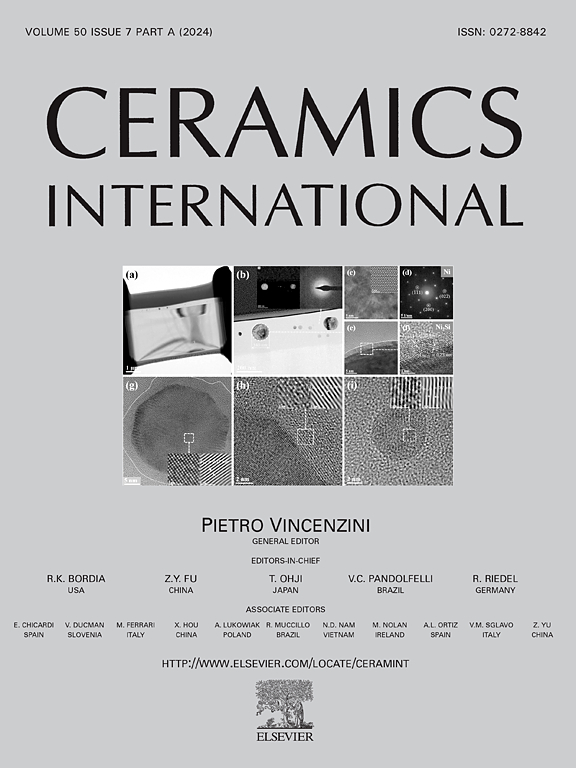Synthesis, microstructure and physical properties of celsian Ba1−xCaxAl2Si2O8
IF 5.1
2区 材料科学
Q1 MATERIALS SCIENCE, CERAMICS
引用次数: 0
Abstract
Monoclinic barium aluminosilicate (celsian) shows application potential owing to its high-temperature resistance, low thermal conductivity, and excellent oxidative reduction properties. Hexacelsian can easily undergo nucleation because of its favorably symmetric crystal structure, resulting in faster precipitation compared to than in the case of celsian. Celsian can only be formed through the sluggish transformation of hexacelsian at high temperatures. In this study, celsian doped with different contents of CaO was synthesized through a simple one-step solid-state reaction process at lower temperatures and in a shorter time and investigated using differential thermal analysis, phase characterization, microstructural observation, and FactSage thermodynamic calculations. Results showed that the addition of CaO could promote the solid-state reaction, affording products such as barium silicate, hexacelsian, and celsian at lower temperatures. Moreover, CaO could promote the synthesis of celsian in the form of solid solution, affording fully monoclinic celsian Ba0.7Ca0.3Al2Si2O8 with only 3 h of holding time at 1400 °C. The optimal addition of CaO showed a decreasing trend with the increase in heat treatment temperature. An optimum CaO level of 0.1 ≤ x ≤ 0.3 was recommended to stabilize celsian. The effects of CaO addition and temperature on the physical, mechanical and thermal conductivity properties of Ba1-xCaxAl2Si2O8 were investigated, and Ba1-xCaxAl2Si2O8 also exhibited excellent antioxidant reduction properties.
铈镧系 Ba1-xCaxAl2Si2O8 的合成、微观结构和物理性质
单斜铝硅酸钡(celsian)具有耐高温、热导率低和优异的氧化还原性等特点,因此具有应用潜力。由于六方铝硅酸盐的晶体结构具有良好的对称性,因此很容易形成晶核,沉淀速度也比钙铝硅酸盐快。只有在高温条件下,六碳铈才会发生缓慢的转变而形成铈镧系元素。本研究通过简单的一步固态反应过程,在较低的温度和较短的时间内合成了掺杂不同含量氧化钙的celsian,并利用差热分析、相表征、微观结构观察和FactSage热力学计算对其进行了研究。结果表明,CaO 的加入可促进固态反应,在较低温度下产生硅酸钡、六硒和硒等产物。此外,CaO 还能促进固溶体形式的钙钛矿的合成,在 1400 °C 下只需保持 3 小时就能得到完全单斜的钙钛矿 Ba0.7Ca0.3Al2Si2O8。随着热处理温度的升高,CaO 的最佳添加量呈下降趋势。推荐的最佳氧化钙含量为 0.1 ≤ x ≤ 0.3,以稳定塞尔希安。研究了 CaO 添加量和温度对 Ba1-xCaxAl2Si2O8 物理、机械和导热性能的影响,发现 Ba1-xCaxAl2Si2O8 还具有优异的抗氧化还原性能。
本文章由计算机程序翻译,如有差异,请以英文原文为准。
求助全文
约1分钟内获得全文
求助全文
来源期刊

Ceramics International
工程技术-材料科学:硅酸盐
CiteScore
9.40
自引率
15.40%
发文量
4558
审稿时长
25 days
期刊介绍:
Ceramics International covers the science of advanced ceramic materials. The journal encourages contributions that demonstrate how an understanding of the basic chemical and physical phenomena may direct materials design and stimulate ideas for new or improved processing techniques, in order to obtain materials with desired structural features and properties.
Ceramics International covers oxide and non-oxide ceramics, functional glasses, glass ceramics, amorphous inorganic non-metallic materials (and their combinations with metal and organic materials), in the form of particulates, dense or porous bodies, thin/thick films and laminated, graded and composite structures. Process related topics such as ceramic-ceramic joints or joining ceramics with dissimilar materials, as well as surface finishing and conditioning are also covered. Besides traditional processing techniques, manufacturing routes of interest include innovative procedures benefiting from externally applied stresses, electromagnetic fields and energetic beams, as well as top-down and self-assembly nanotechnology approaches. In addition, the journal welcomes submissions on bio-inspired and bio-enabled materials designs, experimentally validated multi scale modelling and simulation for materials design, and the use of the most advanced chemical and physical characterization techniques of structure, properties and behaviour.
Technologically relevant low-dimensional systems are a particular focus of Ceramics International. These include 0, 1 and 2-D nanomaterials (also covering CNTs, graphene and related materials, and diamond-like carbons), their nanocomposites, as well as nano-hybrids and hierarchical multifunctional nanostructures that might integrate molecular, biological and electronic components.
 求助内容:
求助内容: 应助结果提醒方式:
应助结果提醒方式:


